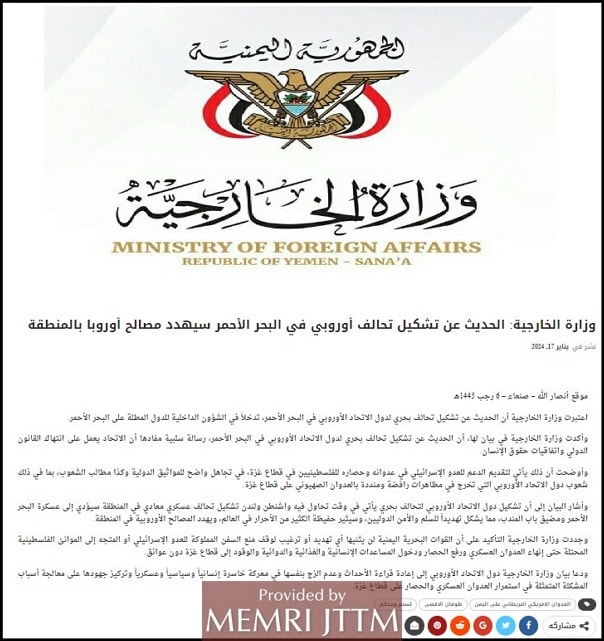The following report is now a complimentary offering from MEMRI's Jihad and Terrorism Threat Monitor (JTTM). For JTTM subscription information, click here.
On January 17, 2024, the Yemeni Houthi Ansar Allah movement's Ministry of Foreign Affairs published an official statement responding to recent Arab and Western media reports that the European Union intends to send a naval task force to the Red Sea to defend naval routes in the region from Houthi aggression.[1] The statement claims that this initiative constitutes "interference in the domestic matters of the countries on the coast of the Red Sea" and that the reports send the negative message that the EU is violating international law and human rights treaties with the goal of "assisting the Israeli enemy in its aggression and siege of the Palestinian people in Gaza."[2]

In addition, the statement argues that the establishment of a "naval coalition" by the E.U. parallels the "American-British attempt to establish a hostile military coalition in the region [i.e. Operation Prosperity Guardian] that will militarize the Red Sea and the Bab-el-Mandab Strait." It adds that such an act will "undermine international peace and security, enrage many of the free peoples of the world, and endanger European interests in the region."
According to the statement, the Yemeni navy will continue to prevent the passage of ships belonging to "the Israeli enemy" or sailing towards "occupied Palestine" until the "military aggression" and siege against the Gaza Strip end. It calls on E.U. countries to "re-examine the situation and avoid getting mixed up in a losing war – from a humanitarian, political, and military perspective."
Operation Prosperity Guardian, the U.S.-led naval coalition tasked with safeguarding international shipping routes in the Red Sea, sparked similar responses and threats from the Houthis, who referred to it as an "alliance of disgrace" and warned that it would lead to the expansion of the conflict in the region.[3]
[1] Euronews.com, January 12, 2024; Alghad.tv, January 16, 2024; Aawsat.com, January 16, 2024.
[2] January 17, 2024.
[3] Houthi Ansar Allah Movement Officials: Prosperity Guardian Alliance Is 'Alliance Of Disgrace;' We Will Continue Our Mission To Stop 'The Genocide In Gaza;' 'Fasten Your Seatbelts. The War Against The International Alliance Of Zion Is Possibl', December 18, 2023; and Houthi Ansar Allah Movement Claims Attack On Two Ships In Red Sea 'With A Connection To' Israel; Responding To Projected U.S. Launch Of Operation Prosperity Guardian Houthi Spokesman: 'Whoever Aspires To Expansion Of The Conflict Must Bear The Consequences', December 19, 2023.
The full text of this post is available to subscribers.
Please login or register to request subscription information from MEMRI


